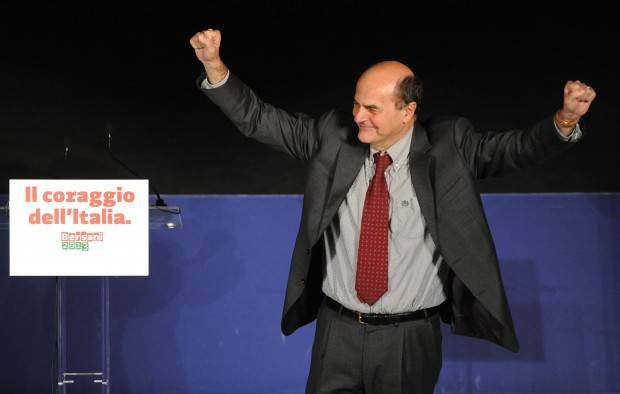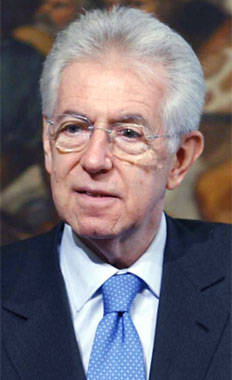Light at the End of the PD Primaries Tunnel
ROME - Yes, Pier Luigi Bersani has triumphed, walking away with 63.45% of the votes in Sunday's primaries run-off for leadership of the Partito Democratico (PD). "What a splendid day for democracy," crowed Bersani. If so, ironically, this was in good part thanks to Bersani's far younger rival, Matteo Renzi. Although Renzi won only 36.48%, his style and presence has changed the very nature of Italian political discourse. It was not only that Renzi, 37, showed - better, flaunted - his youthful mind- set by conceding to 61-year-old Bersani in a Twitter message. Here are instances of other important changes in a political horizon more accustomed to stagnation:
Although the Partito Democratico, born out of the ashes of the old Communist party (PCI),held a liberal and social democratic element from the outset, it had drifted backward in the direction of the old-style synergic coalition of hard-core labor flanked by serious post-Marxists and leftist Catholics. Sensing this, at the keenest point of their rivalry Bersani commented slyly (and disapprovingly) that Renzi declined to attack the "Destra" (the Rightists). But elsewhere commentators found this praiseworthy, because, they said, the PD will never be the same again: its base of support has been broadened to incorporate the heirs of the wartime Partito d'Azione and its progressive heritage in the postwar era. This, perhaps the most important result of the PD primaries, should make that party more appealing in the coming national general elections, even to some of those who had previously backed Silvio Berlusconi.
The democracy factor - the generally civilized public exchange of points of view between adversaries of the same party - was almost universally noted, with admiration. Bersani had the merit of having chosen a tough road; he was willing to hold the primaries against an adversary who was running to win, and might have. "The primaries showed great vitality," boasted the Piedmontese PD regional secretary, Gianfranco Morgando, while also admitting his pleasure that the last-minute petty squabbles between the more conservatice, traditional Bersani and the more innovative Renzi did not damage the outcome.
Not least, Beppe Grillo's shout them down and shock'em strategy worked for a time, but Renzi's more reasonable, and more democratic, protests, aired in public in a rational fashion, captured the limelight and the political imagination. "Until now we've seen two types of protest," said Dario Franceschini, a PD leader. "There's the anti-system abstentionism advocated by Grillo, and there's the complete renouncing of interest in politics, to be left to the technicians. The primaries showed the existence of another way to react to the disappointment and lack of confidence that have been characterizing Italian politics." Let's hope the Partito della Liberta' (PdL) gets the message, he added.
That party too is slated to hold primaries, but continues to be split between those touting for them, led by Angelino Alfano, the PdL party secretary. AP called that party a "shambles," and that is the correct word. Alfano is at odds with Berlusconi one day and best friends the next. Berlusconi is still hostile to primaries, which Alfano and others want, and is still agonizing over whether or not to create a new party. He is also still threatening to bring down the emergency government led by economist Mario Monti.
Given the meltdown of Berlusconi's once-mighty PdL, Bersani's PD is counted upon to prevail in future elections for Parliament, with a fair chance that Bersani himself may succeed Monti as premier. However, depending upon the shape of the still unreformed election law called, insultingly, the "Porcellum" (Pig Law), the PD may need coalition partners. The most likely in that case is Pier Ferdinando Casini, leader of a centrist Catholic-oriented party. As for Monti himself, he is being cagy about the future - but no one is counting him out of the picture; while not a politicians he has brightened Italy's reputation in the rest of the world and remains the single most popular public figure in Italy. Polls last month showed that, although his popularity has dropped from the 60+% of last year, it is now around 50%, exceptionally high after thirteen months in office. As YouTrend points out (see: www.youtrend.it/fiducia-mario-monti), when the spread between Germany interest rates on long-term bonds drops, confidence in Monti surges upward and vice versa.
Predictions are that, if Monti does not succeed himself as premier or accept a top slot in a future Bersani cabinet, he will be boosted upward into an important job within the European political firmament, where Mario Draghi already holds the keys to the European Central Bank. Just as Monti has softened European and U.S. views on Italy's capacity to ride out the recession, Draghi has initiated policies recognized as having improved euro money market conditions and eased tensions on the financial markets. There may het be light at the end of the tunnel and, if so, Monti and Draghi are holding the floodlights while Bersani and Renzi, who are almost obliged to continue in tandem, are bringing more light into the picture.






































i-Italy
Facebook
Google+
This work may not be reproduced, in whole or in part, without prior written permission.
Questo lavoro non può essere riprodotto, in tutto o in parte, senza permesso scritto.